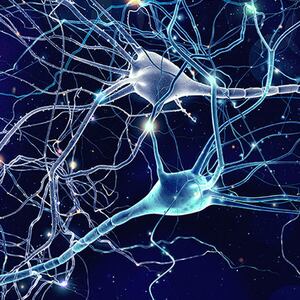While proteins help build and repair muscle, keep us safe from disease, and dispose of chemical waste, they can also sometimes go haywire. When that happens, they end up causing disease rather than preventing it. One common way this occurs is when proteins aren’t folded into their correct shapes due to a genetic fluke or aging. For the millions of Americans living with neurodegenerative diseases like Alzheimer’s, Parkinson's, and dementia, these misfolded proteins clump together and ravage the brain, thereby robbing patients of a healthy life. Science has yet to arrive at an effective cure—but we might be closer to one than we think.
Researchers in Europe have discovered a mechanism that triggers cells to correct misfolded proteins on their own, according to a new study published Friday in the journal Nature Communications. The trigger? It’s stress.
“Just like when we get stressed by a heavy workload, so, too, cells can get ‘stressed’ if they’re called upon to produce a large amount of proteins,” Edward Avezov, a cell biologist at the University of Cambridge and the study’s lead researcher, said in a press release. “There are many reasons why this might be, for example when [cells] are producing antibodies in response to an infection.”
Typically in healthy individuals, any misfolded protein is caught by a cell’s quality control system. But in neurodegenerative diseases like dementia and Alzheimer’s, misfolded proteins are entirely overlooked. In the area where proteins are formed in cells called the endoplasmic reticulum, chaos ensues when these misfolded proteins build up and stick around for too long. This can ultimately lead to the kind of brain damage seen in patients with neurodegenerative diseases. Unfortunately, current pharmaceutical drugs have had limited success in eradicating these misfolded proteins wholesale and most treatments focus on alleviating symptoms.
Since the endoplasmic reticulum makes about a third of all proteins found in the body, the researchers wanted to see whether stressing it out with chemicals or heat resulted in it cracking under pressure and manufacturing misfolded proteins. However, they actually discovered the exact opposite.
“We were astonished to find that stressing the cell actually eliminated the aggregates—not by degrading them or clearing them out, but by unraveling the aggregates, potentially allowing them to refold correctly,” said Avezov.
The researchers also discovered a key to this mechanism: heat shock proteins. These proteins are a cell’s first line of defense when the body encounters stressful conditions like rising heat. Avezov thinks these molecular protectors are the reason linking saunas and heat therapy to lowered dementia risk.
“There have been some studies recently of people in Scandinavian countries who regularly use saunas, suggesting that they may be at lower risk of developing dementia,” he said. “One possible explanation for this is that this mild stress triggers a higher activity of [heat shock proteins], helping correct tangled proteins.”
Don’t go rushing to build your own outdoor Swedish sauna just yet. We still don’t know how to harness this mechanism without stressing out cells too much, which could cause more damage than good. Forging a viable treatment will take scientists many more years of research and clinical trials. But at the very least, we’re peeling away the unknown of misfolded proteins and getting answers that will help patients in the future.







